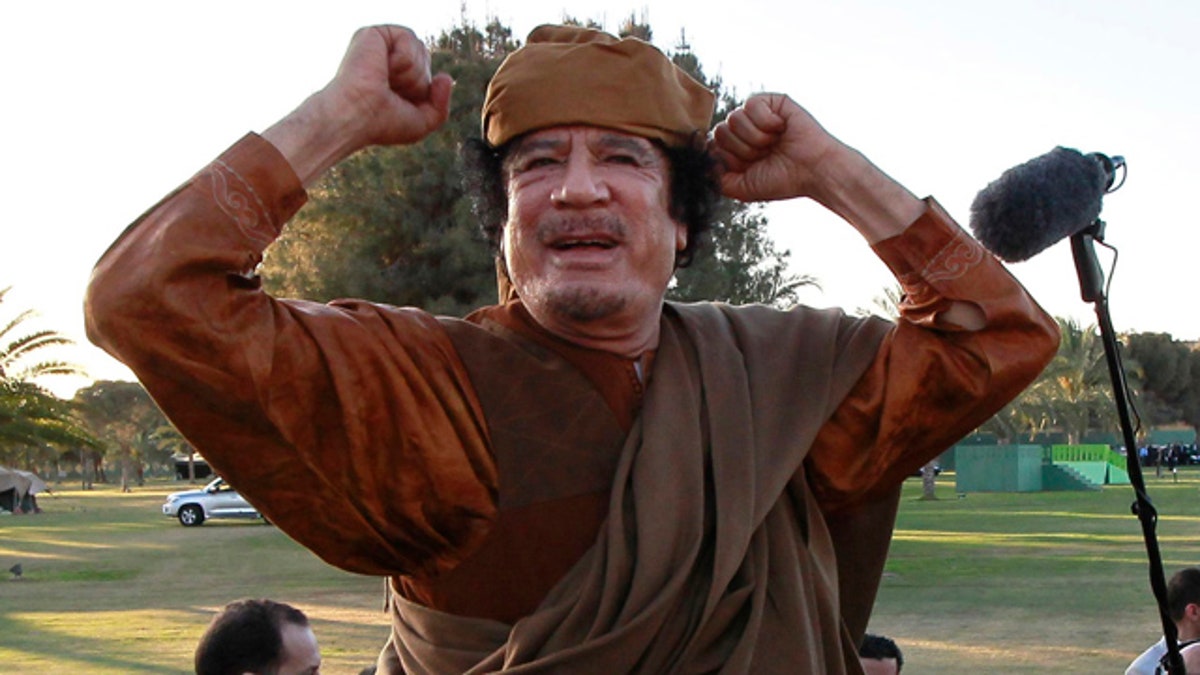
April 10: Libyan leader Muammar al-Qaddafi gestures to his supporters in Tripoli, Libya. (AP2011)
MALABO, Equatorial Guinea – The body representing nations in Africa called on its members to disregard the International Criminal Court's arrest warrant for Muammar al-Qaddafi, an official confirmed Saturday, in a move that seriously weakens the tribunal's ability to bring the embattled Libyan leader to justice.
The decision passed by the 53-member African Union late Friday states that the warrant against Qaddafi "seriously complicates" efforts by the organization to find a solution to the Libyan crisis.
AU executive Jean Ping also told reporters that the ICC is "discriminatory" and only goes after crimes committed in Africa, while ignoring those he says were committed by Western powers in places like Iraq, Afghanistan and Pakistan.
"With this in mind, we recommend that the member states do not cooperate with the execution of this arrest warrant," said the motion, which was shown to The Associated Press and whose passage was confirmed by Daniel Adugna, a spokesman in the AU commissioner's office.
If countries in Africa abide by the recommendation, it opens the possibility that Qaddafi could avoid prosecution by seeking refuge on the soil of his neighbors.
That has been the case for President Hissene Habre, who is accused of thousands of political killings and the systematic torture of his opponents when he ruled Chad, from 1982 to 1990, before fleeing to Senegal. He has yet to face a trial even though Senegal agreed in 2006 to create a special court to try him.
Habre has become a symbol of Africa's inability to try its own, and on Friday the AU attempted to address this in a parallel decision, expressing its frustration with Senegal's foot-dragging, which has included claims that the trial would be too expensive.
"The trial of Hissene Habre is a challenge that the AU and its member states must address vigorously in the context of the principle of rejection of impunity," according to the progress report on the case. "It is incumbent on Senegal in accordance with its international obligations to take steps to bring Hissene Habre to trial, or extradite him."
A total of 31 states in Africa are signatories to the International Criminal Court, representing nearly a third of the nations where the mandate applies. However, there has been increasing malaise in Africa over the ICC, which has been denounced by the continent's entrenched rulers as an instrument of neocolonialism.
Being a signatory has not always signaled compliance, and Sudanese President Omar al-Bashir, who was indicted of charges of genocide in Darfur, has been able to thumb his nose at the court, repeatedly flying to friendly nations like Kenya without arrest.
Diplomats present during this week's AU summit in Malabo said that although they support the court, they agree with the AU's claim that the warrant complicates effort to end the crisis in Libya.
"If he knows he has nowhere to go, he will fight till the end. He would rather die than be tried," according to a Western diplomat who requested anonymity because he was not authorized to speak to the media.
Qaddafi's chief of staff Bashir Saleh, who traveled to Malabo to attend the summit, applauded the AU's decision, holding a copy of it in his hand on Friday evening as the heads of state emerged for their declaration following a day of closed-door deliberations on Libya.
They announced that they were inviting the warring sides to talks which will begin soon in Addis Ababa and which aim to put in place a transitional government that will oversee state affairs until new elections can be held.
Libyan government spokesman Moussa Ibrahim welcomed the AU's decision not to enforce the ICC warrant, repeating the government's position that the court is an "imperialist" institution that only targets African leaders, but not Western officials.
"The ICC is a European Guantanamo Bay. It's only against the African leaders. It never deals with the crimes committed by the United States of America ... and by the European powers ... everywhere in the world."
